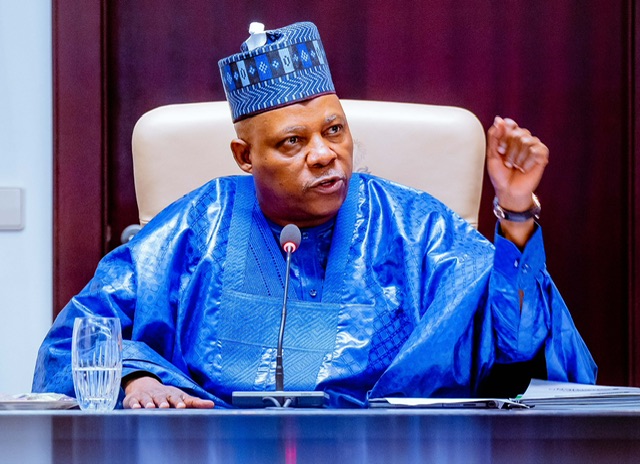Vice-President Kashim Shettima says the African Continental Free Trade Agreement (AfCTA) will grow Africa’s gross domestic product (GDP) by $450 billion in 2034.
Stanley Nkwocha, spokesperson for the vice president, made this known in a statement on Thursday, saying that Shettima spoke during the African economy of scale plenary on the sidelines of the ongoing World Economic Forum (WEF) in Davos, Switzerland.
With AfCFTA projected to rise by $450 billion in the next decade, Shettima said the African trade agreement demonstrates the continent’s urgency for commerce cooperation.
He said the total gross domestic product of African countries is barely $3.1 trillion, or less than three percent of the global GDP.
“African trade still hovers at 3% of world trade. These indices must be reversed and ramped up. I believe this is one of the key concerns of the African economy of scale,” Shettima said.
“It must be borne in mind that African economies are still largely primary and basic in nature, with considerable dependencies on the global economy. Most countries on our continent are still known for their exports of raw materials, minerals, and food crops.
“African economies understand that we must begin to add value to primary products like cash crops and step up to secondary and tertiary product manufacturing.”
Shettima said that because of this, leading analysts worldwide view Africa as a developing continent in desperate need of infrastructure and investment.
He, however, told African leaders that economies of scale “portend the ability to do more” by coming together and forming “a more formidable unit, with a bigger voice and stronger negotiating abilities.”.
SHETTIMA TELLS AFRICAN LEADERS TO ALLEVIATE POVERTY
The vice president urged African leaders to alleviate poverty on the continent and demonstrate its potential for global productivity, integrating better with the world in an age where artificial intelligence (AI) and machine learning are redefining human interactions.
“Size matters in negotiations and scalability. And African nations need more productivity to improve our people’s standards of living,” he said.
“We need more food, more affordable housing, a burgeoning textile sector to clothe our people, more energy/power, more social services for our poor and disempowered people, cheaper, better transportation systems. Our work is well cut out for us.
“Pooling resources together as African nations allows us to cut cost of producing many of those necessities for our peoples. We need to achieve higher levels of efficiency both in our public and private sectors.”
He applauded the concept of economies of scale for Africa, calling it appropriate given that the continent is perceived as the final frontier for growth and that there are a plethora of chances there.
Shettima estimated that Africa’s infrastructure shortfall is in the trillions of dollars; however, he said the continent’s problems are not negatives but rather chances for participation, production, and profitability.
Highlighting some of the deficit, he said, “51 new housing units have to be built at the very minimum. We need schools, stadia, community centres, roads, rail networks, airports, water transport, technology enablement, and major interventions in the energy sector, among others.”
“Viewed from space, Africa still presents as the darkest continent. This narrative can be changed by a combination of efforts and deep collaborations among ourselves and the global community. I aver though, that the greater challenge was within ourselves,” Shettima said.
He said the concept of Africa’s economy of scale is a wake-up call to embrace a major leap of faith, away from derogatory labels that have traditionally been attached to the people and the continent.






